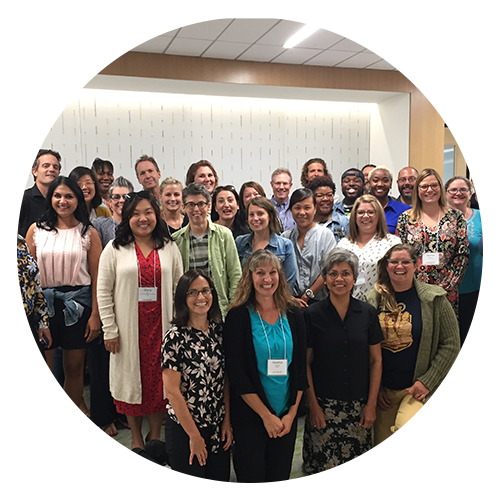Core Values
- We are committed to equity. We want all students to have the support and opportunity to access a rigorous and engaging curriculum. To ensure this literacy equity, it is important that students work with teachers who understand the critical role of literacy in content-area learning.
- We believe there are powerful ways to build on adolescents’ and adults’ knowledge and experience to help them become more successful readers of academic texts. We know that when teachers make particular changes in their content-area instruction, literacy, learning, and engagement improve.
- We believe in the power of collaborative inquiry to equip teachers and students with the intellectual tools they need to develop a critical, reflective stance toward their own teaching and learning, the identification of problems, and the development of solutions.
- We are committed to teacher professionalism. We believe that teachers continue to grow when they can build on their current knowledge and expertise in a professional community that provides frequent opportunities for reflection and support.
- We are committed to an ongoing program of research that serves the dual purposes of informing our professional development practice and enabling us to contribute to the national dialogue on what works to advance literacy learning.
- We are committed to a strong organizational culture: one that is responsive to learning from our colleagues in the practitioner, research, and policy communities; that values individuals’ initiative and contributions to collaborative work; and, that supports staff in balancing work with other aspects of our lives.
Our Mission
Reading Apprenticeship is committed to improving learning outcomes for middle school, high school, and college students by assisting them to become powerful, strategic, and independent readers.
We work toward this mission by designing and facilitating professional learning focused on helping all students achieve higher levels of academic literacy. We continuously improve our work through research and development and we make our work accessible through grant-funded activities.
We carry out our mission in the context of convening and providing support for a national network of middle school, high school, and college educators working to embed the Reading Apprenticeship instructional framework in their varied local contexts.
Our history of transforming instruction for equitable literacy and proven outcomes
Reading Apprenticeship was first developed in the 1990s when a few secondary teachers and researchers in San Francisco began working together to find new ways to deepen student learning. The field had many interventions for elementary students, but few supports for older students and content-area teachers who grapple with more complex texts. Additionally, the existing solutions were most often focused on either academic or non-cognitive factors, as though they are independent of one another! The integrated approach to teaching and learning that this group developed became Reading Apprenticeship. Over the years since, WestEd and a host of teachers, foundations, and government agencies have invested in this approach so that Reading Apprenticeship remains a vibrant, continuously improving community of practice.
1988–1996: The Beginning
Dr. Cynthia Greenleaf and Ruth Schoenbach break the research-practice divide and work closely with teachers in San Francisco to generate new ways to support reading comprehension in content area classrooms. The Reading Apprenticeship Framework is created, and Ruth and Cyndy join WestEd.
1996–2004: Support and Practice Yields Evidence
- Greenleaf and Schoenbach secure regional and national foundation funding centered on the framework.
- A 2001 pilot study of the 9th grade curriculum and professional learning – Reading Apprenticeship Academic Literacy (RAAL) – yields student test score gains of two years growth in seven months.
- Publication of Reading for Understanding, first edition
2000-2005: Reading Apprenticeship Goes to College
- Reading Apprenticeship leaders teach college preparation programs.
- Faculty Inquiry Groups engage in communities of practice in California colleges.
- Jossey Bass and WestEd publish Rethinking Preparation for Content Area Teaching.
2005–2010: Three High Stakes Trials Prove Effectiveness
- Three rigorous research studies, funded by the U.S. Department of Education’s Institute of Education Sciences and the National Science Foundation, find positive, statistically significant effects for students whose teachers participated in Reading Apprenticeship professional learning.
- College work expands with grants from the Lumina and Hewlett Foundations. One hundred and eighty-eight teachers from 43 colleges participate in professional learning networks.
2010–2015: Impact at Scale and New Online PD
The Reading Apprenticeship team is awarded several competitive federal innovation grants resulting in:
- Expansion of services to 12+ states
- Reading Apprenticeship online professional learning model and service
- Validation of Reading Apprenticeship at scale (RAISE)
- Project READi develops evidence-based argumentation units for history and science educators
2014–2017: College Work Deepens with 12 Campus STEM Initiative
- A Helmsley Trust grant expands our work with post-secondary STEM faculty.
- Renton Technical college hosts annual Metacognition and Mindfulness Reading Apprenticeship Conference.
- A three-year evaluation for the California Community Colleges reports promising impacts of Reading Apprenticeship.
- Leading for Literacy is published.
2015–2020: Growth in School-Year Support and New Evidence
- Services now include small group coaching and year-round online professional learning.
- First studies of cross-disciplinary professional learning at scale – RAAD and SETDI projects.
- 3CSN hosts annual California Reading Apprenticeship College Conference.
- AERJ publication of research showing statistically significant change for teacher practice and student learning in biology.
2020+ Reading Apprenticeship Today
Our story continues to evolve with new leadership. Linda Friedrich, Director of Literacy at WestEd, is leading the Reading Apprenticeship team as we embark on new initiatives to further develop and disseminate services and build more literacy leaders in districts across the country. We work with 2000+ educators each year in all settings – large urban districts, small rural communities, suburban centers, and online. Our current and upcoming work includes: open-source text-based investigation modules for STEM teachers; formative assessment tools to enhance Reading Apprenticeship’s impact on curiosity and self-direction; and college STEM and writing courses. We published a 3rd edition of our core text, Reading for Understanding, in 2023.

